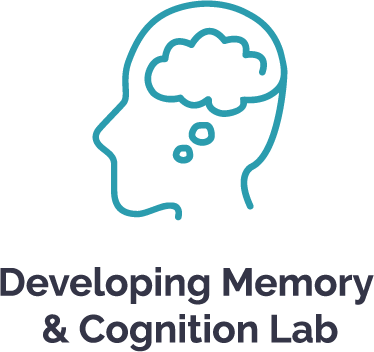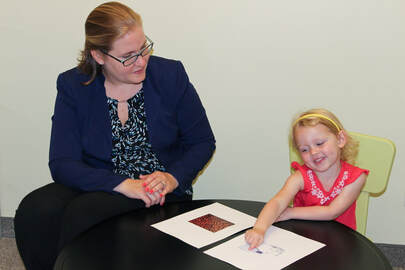Episodic Future Thinking: Projecting the Self into the Future
Projecting oneself into the future is a critical skill for anticipating future needs and states that allows for better planning and understanding of the consequences of one's actions. Our lab is interested in how young children and adults develop the appreciation that their future states may differ from their current states and how this informs their decision making.
We are also broadly interested in the measurement of children's future-oriented cognition and have recently developed the Children's Future Thinking Questionnaire, a parent-report measure of children's performance in five domains of children's future thinking.
Former PhD student, Tessa Mazachowsky and Dr. Mahy co-wrote an article in The Conversation about young children's saving ability.
Recent research in our lab is examining:
(1) the coherence and development of children's saving behaviour (Rocca, Kamber, Mazachowsky, & Mahy, in progress)
(2) how do traits influence children's predictions of whether a child will save or spend (Kamber, Rocca, & Mahy, in progress)
(3) the processes that support episodic future thinking in middle childhood (Kamber & Mahy, in progress)
(4) how temporal distance and direction can influence episodic and semantic detail in children's event representations (Mahy, Kszan, Altgassen, Nyhout, & Atance, in progress)
We are also broadly interested in the measurement of children's future-oriented cognition and have recently developed the Children's Future Thinking Questionnaire, a parent-report measure of children's performance in five domains of children's future thinking.
Former PhD student, Tessa Mazachowsky and Dr. Mahy co-wrote an article in The Conversation about young children's saving ability.
Recent research in our lab is examining:
(1) the coherence and development of children's saving behaviour (Rocca, Kamber, Mazachowsky, & Mahy, in progress)
(2) how do traits influence children's predictions of whether a child will save or spend (Kamber, Rocca, & Mahy, in progress)
(3) the processes that support episodic future thinking in middle childhood (Kamber & Mahy, in progress)
(4) how temporal distance and direction can influence episodic and semantic detail in children's event representations (Mahy, Kszan, Altgassen, Nyhout, & Atance, in progress)
Relevant Publications
Kamber, E., Maguire, M. K., Tehrani, E. H., Mazachowsky, T. R., & Mahy, C. E. V. (2024). The impact of strategies on young children’s saving for the future. Journal of Experimental Child Psychology, 246, 105995.
Kamber, E., Mazachowsky, T. R. & Mahy, C. E. V. (2023). The emergence of future-oriented cognition in toddlerhood: The contribution of cognitive and language abilities. Journal of Cognition and Development, 24(3), 397-419. [PDF]
Mazachowsky, T. R., Atance, C. M., Rutt, J., & Mahy, C. E. V. (2023). Verbal explanations and item choices as joint indices of children’s episodic foresight. Journal of Cognition and Development, 24, 17-36. [PDF]
Mazachowsky, T. R., McKenzie, K., Busseri, M., & Mahy, C. E. V. (2021). “These pretzels are making me thirsty” so I’ll have water tomorrow: A partial replication and extension of adults’ induced episodic foresight. PLOS ONE, 16, e0259424. [PDF]
Atance, C. M., Rutt, J., Cassidy, K., & Mahy, C. E. V. (2021). Young children’s future-oriented reasoning for Self and Other: Effects of conflict and perspective. Journal of Experimental Child Psychology, 209, 105172. [PDF]
Mahy, C. E. V., Masson, C., Krause, A., & Mazachowsky, T. R. (2020). The effect of episodic future simulation and motivation on young children’s induced-state episodic foresight. Cognitive Development, 56, 100934. [PDF]
Mazachowsky, T. R., Atance, C. M., Mitchinson, S., & Mahy, C. E. V. (2020). “What should you bring with you to this place?”: Examining children’s episodic foresight using open-ended questions. Journal of Genetic Psychology, 181, 223-236. [PDF]
Mazachowsky, T. R., & Mahy, C. E. V. (2020). Construction of the children’s future thinking questionnaire: A reliable and valid parent-report measure of children’s future-oriented cognition. Developmental Psychology, 56, 756-772. [PDF]
Mahy, C. E. V., Moses, L. J., O’Brien, B., Castro, A., Kopp, L., & Atance, C. M. (2020). The roles of perspective and language on young children’s delay of gratification performance. Journal of Experimental Child Psychology, 192, 104767. [PDF]
Mazachowsky, T. R., Koktavy, C., & Mahy, C. E. V. (2019). The effect of psychological distance on young children’s future predictions. Infant and Child Development, 28, e2133. [PDF]
Atance, C. M., Celebi, S. N., Mitchinson, S., & Mahy, C. E. V. (2019). Thinking about the future: Comparing children’s forced-choice versus “generative” responses in the “Spoon Test”. Journal of Experimental Child Psychology, 181, 1-16. [PDF]
Mahy, C. E. V. (2016). Young children have difficulty predicting future preferences in the presence of a conflicting physiological state. Infant and Child Development, 25, 325-338. doi: 10.1002/icd.1930 [PDF]
Atance, C. M., & Mahy, C. E. V. (2016). Episodic future thinking in children: Methodological and Theoretical Approaches. In S. Klein, K. Michaelian, & K. Szpunar (Eds.), Seeing the Future: Theoretical Perspectives on Future-Oriented Mental Time Travel. New York: Oxford University Press. [Link to Oxford University Press webpage]
Mahy, C. E. V., Grass, J., Wagner, S., & Kliegel, M. (2014). These pretzels are going to make me thirsty tomorrow: Differential development of hot and cool episodic foresight in early childhood? British Journal of Developmental Psychology, 32, 65-77. doi: 10.1111/bjdp.12023 [PDF]
Kamber, E., Mazachowsky, T. R. & Mahy, C. E. V. (2023). The emergence of future-oriented cognition in toddlerhood: The contribution of cognitive and language abilities. Journal of Cognition and Development, 24(3), 397-419. [PDF]
Mazachowsky, T. R., Atance, C. M., Rutt, J., & Mahy, C. E. V. (2023). Verbal explanations and item choices as joint indices of children’s episodic foresight. Journal of Cognition and Development, 24, 17-36. [PDF]
Mazachowsky, T. R., McKenzie, K., Busseri, M., & Mahy, C. E. V. (2021). “These pretzels are making me thirsty” so I’ll have water tomorrow: A partial replication and extension of adults’ induced episodic foresight. PLOS ONE, 16, e0259424. [PDF]
Atance, C. M., Rutt, J., Cassidy, K., & Mahy, C. E. V. (2021). Young children’s future-oriented reasoning for Self and Other: Effects of conflict and perspective. Journal of Experimental Child Psychology, 209, 105172. [PDF]
Mahy, C. E. V., Masson, C., Krause, A., & Mazachowsky, T. R. (2020). The effect of episodic future simulation and motivation on young children’s induced-state episodic foresight. Cognitive Development, 56, 100934. [PDF]
Mazachowsky, T. R., Atance, C. M., Mitchinson, S., & Mahy, C. E. V. (2020). “What should you bring with you to this place?”: Examining children’s episodic foresight using open-ended questions. Journal of Genetic Psychology, 181, 223-236. [PDF]
Mazachowsky, T. R., & Mahy, C. E. V. (2020). Construction of the children’s future thinking questionnaire: A reliable and valid parent-report measure of children’s future-oriented cognition. Developmental Psychology, 56, 756-772. [PDF]
Mahy, C. E. V., Moses, L. J., O’Brien, B., Castro, A., Kopp, L., & Atance, C. M. (2020). The roles of perspective and language on young children’s delay of gratification performance. Journal of Experimental Child Psychology, 192, 104767. [PDF]
Mazachowsky, T. R., Koktavy, C., & Mahy, C. E. V. (2019). The effect of psychological distance on young children’s future predictions. Infant and Child Development, 28, e2133. [PDF]
Atance, C. M., Celebi, S. N., Mitchinson, S., & Mahy, C. E. V. (2019). Thinking about the future: Comparing children’s forced-choice versus “generative” responses in the “Spoon Test”. Journal of Experimental Child Psychology, 181, 1-16. [PDF]
Mahy, C. E. V. (2016). Young children have difficulty predicting future preferences in the presence of a conflicting physiological state. Infant and Child Development, 25, 325-338. doi: 10.1002/icd.1930 [PDF]
Atance, C. M., & Mahy, C. E. V. (2016). Episodic future thinking in children: Methodological and Theoretical Approaches. In S. Klein, K. Michaelian, & K. Szpunar (Eds.), Seeing the Future: Theoretical Perspectives on Future-Oriented Mental Time Travel. New York: Oxford University Press. [Link to Oxford University Press webpage]
Mahy, C. E. V., Grass, J., Wagner, S., & Kliegel, M. (2014). These pretzels are going to make me thirsty tomorrow: Differential development of hot and cool episodic foresight in early childhood? British Journal of Developmental Psychology, 32, 65-77. doi: 10.1111/bjdp.12023 [PDF]




